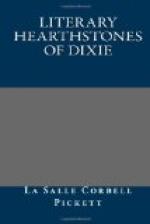At the close of the war, wrecked in health, with only the memory of his beautiful home and library left to him, with not even a piece of the family silver remaining from the “march to the sea,” Hayne went to the pine-barrens of Georgia, eighteen miles from Augusta, to build a new home.
When the first man and woman were sent out from their garden home, it was not as a punishment for sin, but as an answer to their ambitious quest for knowledge and their new-born longing for a wider life. It was not that the gate of Eden was closed upon them; it was that the gates of all the Edens of the world were opened for them and for the generations of their children. One of those gates opened upon the Eden of Copse Hill, where the poet of Nature found a home and all friendly souls met a welcome that filled the pine-barrens with joy for them. Of Copse Hill the poet says:
A little apology for a dwelling was perched on the top of a hill overlooking in several directions hundreds of leagues of pine-barrens there was as yet neither garden nor inclosure near it; and a wilder, more desolate and savage-looking home could hardly have been seen east of the prairies.
What that “little apology of a dwelling” was to him is best pictured in his own words:
On a steep hillside, to all
airs that blow,
Open, and open
to the varying sky,
Our cottage homestead,
smiling tranquilly,
Catches morn’s earliest
and eve’s latest glow;
Here, far from worldly strife
and pompous show,
The peaceful seasons
glide serenely by,
Fulfil their missions
and as calmly die
As waves on quiet shores when
winds are low.
Fields, lonely paths, the
one small glimmering rill
That twinkles
like a wood-fay’s mirthful eye,
Under moist bay-leaves, clouds
fantastical
That float and change at the
light breeze’s will,—
To me, thus lapped
in sylvan luxury,
Are more than death of kings,
or empires’ fall.
Here with “the bonny brown hand” in his that was “dearer than all dear things of earth” Paul Hayne found a life that was filled with beauty, notwithstanding its moments of discouragement and pain. We like to remember that always with him, helping him bear the burdens of life, was that wifely hand of which the poet could say, “The hand which points the path to heaven, yet makes a heaven of earth.”
On sunny days he paced to and fro under the pines, the many windows of his mind opened to the studies in light and shade and his soul attuned to the music of the drifting winds and the whispering trees. When Nature was in darkened mood and gave him no invitation to the open court wherein she reigned, he walked up and down his library floor, engrossed with some beautiful thought which, in harmonious garb of words, would go forth and bless the world with its music.
The study, of which he wrote:




